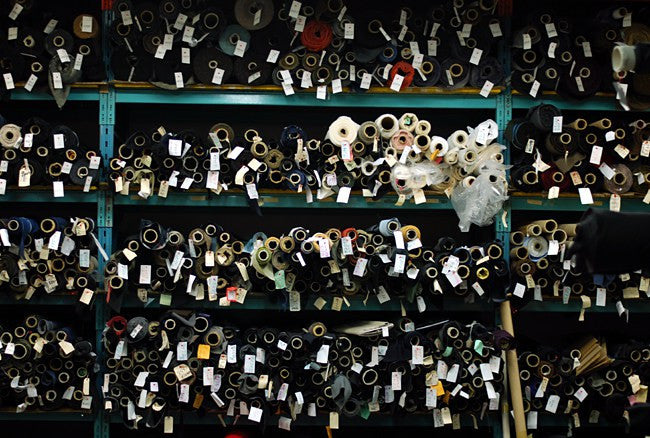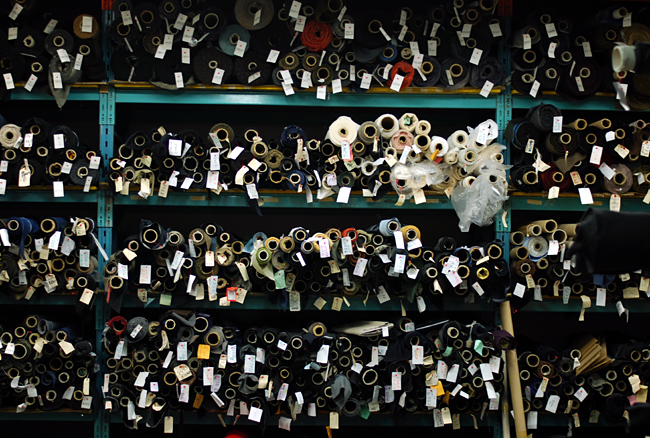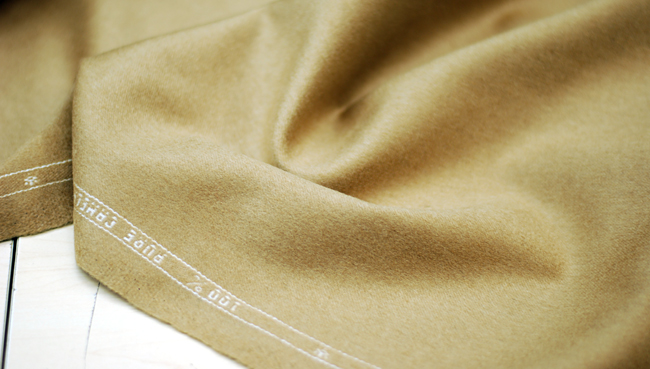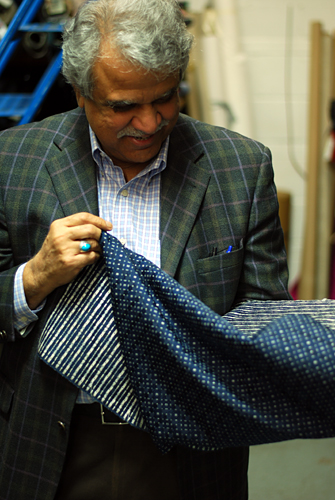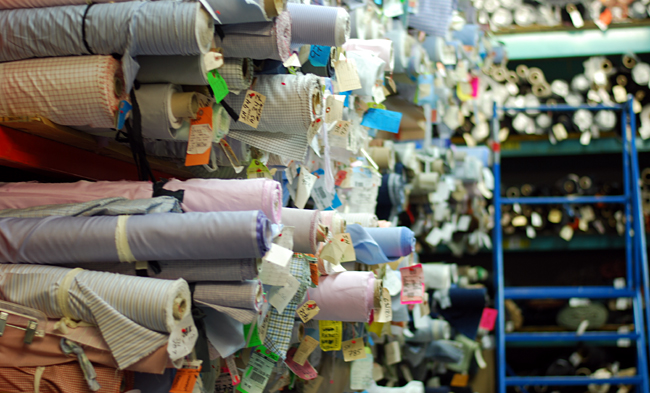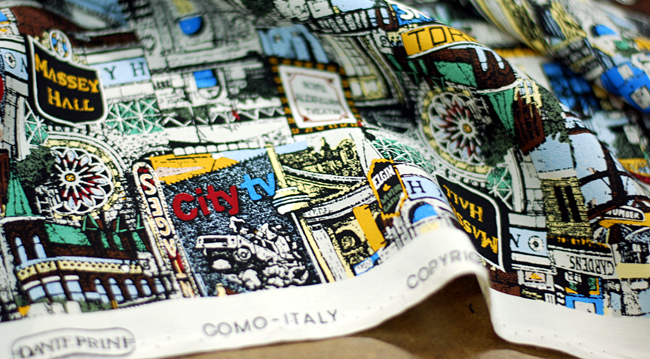“Just feel this cloth,” Sultan Moosa implores as he unwraps a four foot long roll of impossibly soft camel hair. “You can feel the quality.” He immediately pulls another roll, this time luxurious baby alpaca. “This is the very best quality,” he says, using one of his most common phrases, “from one of the world’s best mills.” Then we’re off to another corner of his massive shop, to touch and appreciate cashmere, mohair, doeskin and the astonishingly expensive and rare vicuña, which sells for $5500 a yard. (The average overcoat can use around four yards worth.)
Like a zealous collector of priceless rarities, Sultan lights up as he takes you from one end of the store to the other, unrolling some of the finest fabrics in the world. Even if you don’t ask for anything specific, he will eagerly guide you through the rows and rows of cloth with an infectious passion. Not to try to sell it to you, just to share its tactile wonder. Wrinkly Irish linen, firm worsted wool, fuzzy and spiky Donegal and Harris tweeds. And Sultan’s passion does not come from simply selling fabric but from a lifetime in the textile industry.
Over fifty years ago, at the age of 16, Sultan joined his father at a jute mill in their native India. He spent five years as an apprentice weaver before getting a scholarship to study textiles in Switzerland. Sultan then immigrated to Canada in 1974 and started working for Archie Fine fabrics which, within two decades, he’d bought out and taken over. His career culminated just over five years ago when he opened “Sultan’s Fine Fabrics.” The new shop was a significant step up in his approach. Sultan chose to move away from mass-market and into the niche of “higher quality fabrics from the world’s best mills,” as well as adding shirtings and tie silks.
While Sultan mostly sells direct to the garment industry here in Toronto and around the world, he is seeing an increase of walk-ins, men looking to pick their own fabric for custom suits and shirts. Doing this means getting a much better idea of the look and feel of the fabric than from just a tiny sample at a tailor’s shop. You also save a fair bit of money. However, most guys would not know where to start faced with Sultan’s massive selection. You may want a blue shirt, but what precise shade, weave, weight, and so on? And while Sultan is not a tailor, he has a remarkable amount of knowledge when it comes to suit and shirt construction – a quick glance at me and he knew exactly how many yards would be required for a three piece suit.
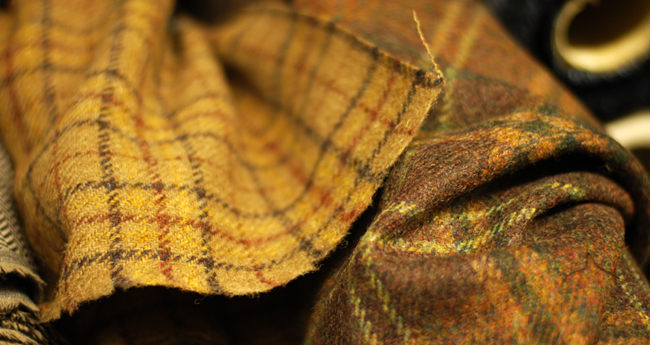
A small selection of Sultan’s richly coloured tweeds.
I would strongly encourage anyone adding custom clothes to their wardrobe to buy their own cloth. You feel an even more intimate connection with the clothes-making process than just being measured and picking a shape for your lapels. However, the best thing about buying your own fabric is developing a sense of what true quality is, by feeling and feeling and feeling metre after metre of cloth. However, I have one caveat. Many tailors today, sadly, will not be too pleased if you bring in your own fabric. On one hand, selling fabric is a way they can make a bit of money on the resale. I’ve also heard from a number of tailors another reason for shunning customer’s fabric: mistakes. Should there be a problem in the tailoring process – an error in cutting, for example – the tailor can’t simply go back to their own stock or supplier and get another yard or two. They must face the indignity of asking the customer to bring in more cloth. That said, mistakes are rare, so I would stick to your guns and insist the tailor use your fabric.
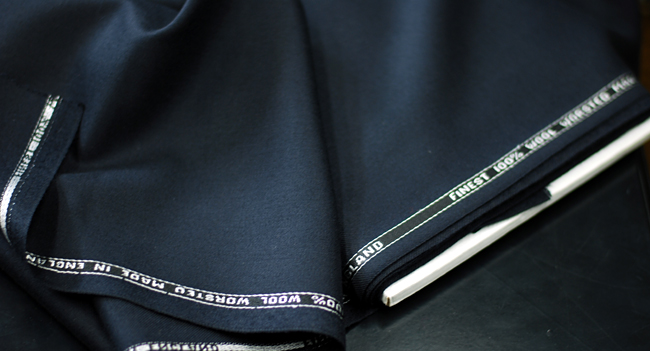
13oz barathea wool suiting.
And while I have not visited every fabric supplier in the Greater Toronto Area, those I have seen pale in comparison to Sultan. Selection is often very limited, as is knowledge. With Sultan, on the other hand, when I asked about barathea for my dream tuxedo, he was able to offer – in stock – both light-weight and medium-weight versions. Barathea is not soft though heavier versions sometimes remind me of flannel; its quality can be felt in its firmness, its ability to be crumpled up and immediately return to smooth. It shimmers slightly without being shiny, it seems to absorb as much light as it reflects. I will eventually go for the medium, 13oz fabric for a heavier, firmer shape. And while most tuxedo lapels are fronted with smooth satin, Sultan stocks classic ribbed grosgrain, in pure silk or a blend. Add to that rayon bemberg lining and I will eventually have a truly time-honoured tuxedo.
So far, I have purchased suiting for two of my custom suits at Sultan’s as well as some lovely broadcloth shirting. The shirting collection, by the way, is something to behold. With over 300,000 metres, it is the largest stock selection in North America. But Sultan does not stop at suiting and shirting: he also stocks some of the finest tie silks in the world, all from Como, Italy, the home of the country’s best silk manufacturers.
Now, if you’ve done the math like I did, you’ll realize that Sultan is around the traditional age for retirement. And so I asked the question that I find myself asking so many people in the garment industry these days, is he planning to shut up shop any time soon? “I enjoy coming to work every day,” he told me with his huge, signature smile, “and for me it’s a passion.” So far so good then, I prodded? “So far terrific,” he says tapping his wooden desk, “I love it.”
Sultan’s Fine Fabrics is located at 89 Bentworth Ave, Unit 2A (South of the 401, west of Dufferin)

